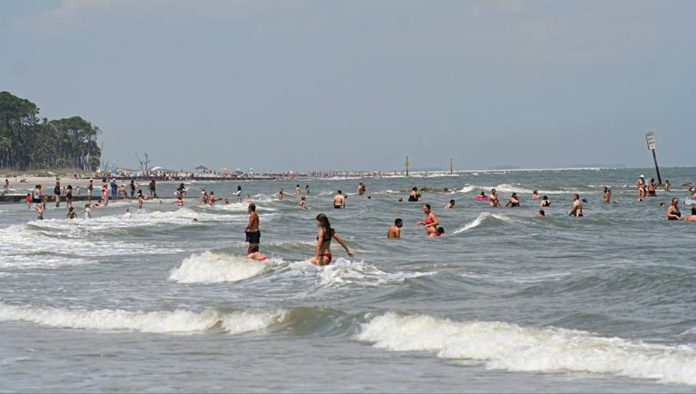Shark attacks in the southeast U.S. are here again. Two men were attacked by sharks in the Atlantic off the northeastern coast of Florida over the weekend and the attacks occurred within about an hour of one another, just 100 miles apart.
The first attack took place around 330pm on Saturday afternoon near Jacksonville Beach Pier in Jacksonville, FL. Two men were surfing together when a shark knocked one of them off of his board and into the water. The shark then bit him on the arm.
The two men managed to catch waves back to shore, where he was treated for his injuries.
The second attack happened around 430pm at New Smyrna Beach, about 100 miles south of Jacksonville. A man was bitten in the leg while boogie boarding, Volusia County Beach Safety said in a public statement.
The man was treated on the scene for lacerations to his right thigh, the statement said. He then drove himself for additional treatment.
The one in Jacksonville appears to have been a blacktip shark. The shark in the second attack was not seen by any witnesses.
A reminder to us in Beaufort
This is a reminder to us that they are out there in our local waters, too, and that we need to always be cautious when enjoying Beaufort’s beautiful beaches.
The fact remains the chances of encountering a shark are rare. And, being attacked or even nipped by one is even rarer.
Shark attacks on our local beaches are indeed very rare. In researching for this article, we found that there was a fatal attack off of Parris Island in 1960 when a recruit attempted to swim from the island.
SCDNR has said it’s usually the blacktip shark implicated in South Carolina bites, calling them ‘bump and runs’; when a shark doesn’t know what it’s grabbing until after a bite and then loses interest.
Since records started being kept as early as 1817, our local area has seen only a few shark bites including two on Fripp Island, one on Hunting Island and two off of St Helena Island. At the other end of Beaufort County, Hilton Head’s beaches have seen several.
Just the facts on attacks
Let’s take a look at some of the facts about the ocean’s most feared occupants.
Out of over 375 different species of sharks found in all of our oceans, only around 30 of them have been reported to have ever attacked a human being. Of these, only about 10 or 12 should be considered particularly dangerous when encountered.
Of the most concern in our coastal waters are great whites, tigers, and bull sharks. Bulls, especially, are known to hang out just offshore in shallow waters.
However, all sharks large and small are predators and could be capable of inflicting wounds if provoked. They should all be treated with respect when encountered.
The chances of being attacked by a shark are very small compared to other animal attacks, natural disasters or beach-side dangers. More people drown in the ocean every year than are bitten by sharks, by a large margin. The few attacks that occur every year are an indication that sharks don’t feed on us and that most attacks that occur are simply due to mistaken identity.
Worldwide there is an average of 50-70 shark attacks every year. Attacks have been increasing over the decades as a result of increased human populations and the use of the oceans for recreational activity; and we’re hearing about each and every one of them because of the addition of a modern media that circles the globe in a matter of minutes.
Simply put…as long as humans continue to enter the sharks’ environment, there will be shark attacks.










